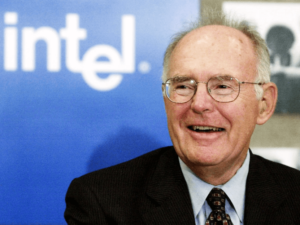Gordon Earle Moore, the co-founder of Intel Corporation and the man behind “Moore’s Law,” has passed away at the age of 94. Moore was a pioneer in the semiconductor industry, and his groundbreaking observation about the rate of growth in computing power has shaped the industry for decades.
Born on January 3, 1929, in San Francisco, California, Moore earned his Bachelor’s degree in Chemistry from the University of California, Berkeley, in 1950. He later went on to receive a Ph.D. in Chemistry and Physics from the California Institute of Technology in 1954.
Moore began his career at the Applied Physics Laboratory at Johns Hopkins University, where he worked on the development of the first commercially successful transistor. In 1957, he joined Shockley Semiconductor Laboratory, where he worked alongside Robert Noyce and six other scientists who would later go on to form Fairchild Semiconductor Corporation.
In 1968, Moore and Noyce left Fairchild to found Intel Corporation, which quickly became a leading producer of microprocessors and other computer components. Moore served as the CEO of Intel from 1975 to 1987, and later as chairman of the board until 1997.
Moore’s Law, first proposed by Gordon Moore in 1965, states that the number of transistors on a microchip will double approximately every two years, while the cost of the microchip will halve over the same period. This observation has proven remarkably accurate over the past five decades and has become a guiding principle for the semiconductor industry.
Moore’s Law has been the driving force behind the rapid advancement of computer technology over the past half-century, enabling smaller, faster, and more powerful devices to be produced at ever-lower costs. The doubling of transistors on a chip every two years has allowed computing power to grow exponentially, and has led to the development of modern computers, smartphones, and other devices that are now ubiquitous in our daily lives.

Despite some predictions that Moore’s Law would eventually reach its limits, it has continued to hold true, with advancements in nanotechnology and other areas of research allowing for even more impressive gains in computing power. However, as the limits of traditional semiconductor technology are being reached, the industry is looking to new materials and technologies to continue pushing the boundaries of computing.
Gordon Moore was not only a pioneer in the semiconductor industry, but also a philanthropist and advocate for education and environmental causes. In 2001, he and his wife established the Gordon and Betty Moore Foundation, which supports scientific research, conservation efforts, and other initiatives aimed at improving the world.
Moore was a recipient of numerous awards and honors throughout his life, including the National Medal of Technology and Innovation and the Presidential Medal of Freedom, the highest civilian honor in the United States.
The legacy of Gordon Moore and his contributions to the field of computing will continue to be felt for generations to come. His groundbreaking observation about the rate of growth in computing power has shaped the industry and has enabled the creation of countless technologies that have transformed the world we live in today.










